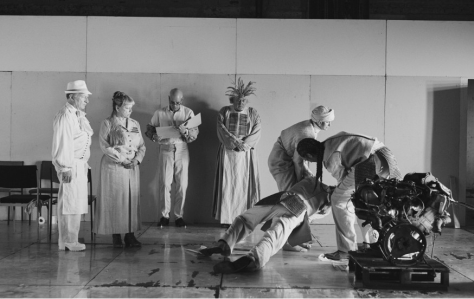That’s all I could think during Mutter Courage und ihre Kinder at the Kammerspiele last night. It dragged on and on for what felt like much longer than two hours. And there was no intermission, so there was no chance of escape. The Munich Kammerspiele has a long history with this show—they actually staged the second-ever production in Germany, with Brecht himself directing. One presumes he made it a lot more interesting than this new production’s director, Thomas Schmauser.

The show was often physically painful. I realize that Brecht plays are supposed to provoke discomfort, but I always thought that was intellectual discomfort. Here, long songs sung off-key and whole scenes that were shouted at the top of the actors’ lungs (in the small black box venue) forced me to cover my ears. Lena Lauzemis’s shrill, nasal voice as Yvette hurt, too. Taking things to extremes can be effective, but not when those extremes are so annoying that they distract from the words and story.

But the overall impression the show left on me was not of pain, but of boredom. I didn’t care about the characters. (Brecht doesn’t really want audiences to, but part of what makes his shows effective is that we usually do, anyway.) I didn’t care about the war. (And I think I actually was supposed to care about that.) I didn’t take away any deep messages about conflict, other than its senselessness. (Although that’s one of the play’s main points, it hardly takes a two hours to convey that.)

Part of the problem was that the cast seemed awfully unenthusiastic, especially for a new production premiere. I imagine it’s actually the director’s fault—that his interpretation of Brechtian style included low-energy performances. Because there was clearly some talent on the stage. As Mother Courage, Ursula Werner showed an impressive command of theatrical technique, with wonderful quick snaps between melodrama and stoic indifference. Stefan Merki’s quietly humorous Cook gave the play its only lively moments.

Not that Schmauser didn’t try to liven things up—he just went about it the wrong way. Unfunny gag after unfunny gag went on far too long. Everyone kept returning to close a door that constantly fell open. The Chaplain suffered from a lack of proper control over his bodily functions and poor personal hygiene. The prompter repeatedly interrupted his soldierly marching on- and off-stage with tap-dancing. The audience sometimes tittered the first time each of these things happened, but never the third or the dozenth.
I was looking forward to seeing Brecht’s masterpiece of twentieth-century theater. Hopefully, I will have another opportunity to see it in the future, because this production left me unimpressed.